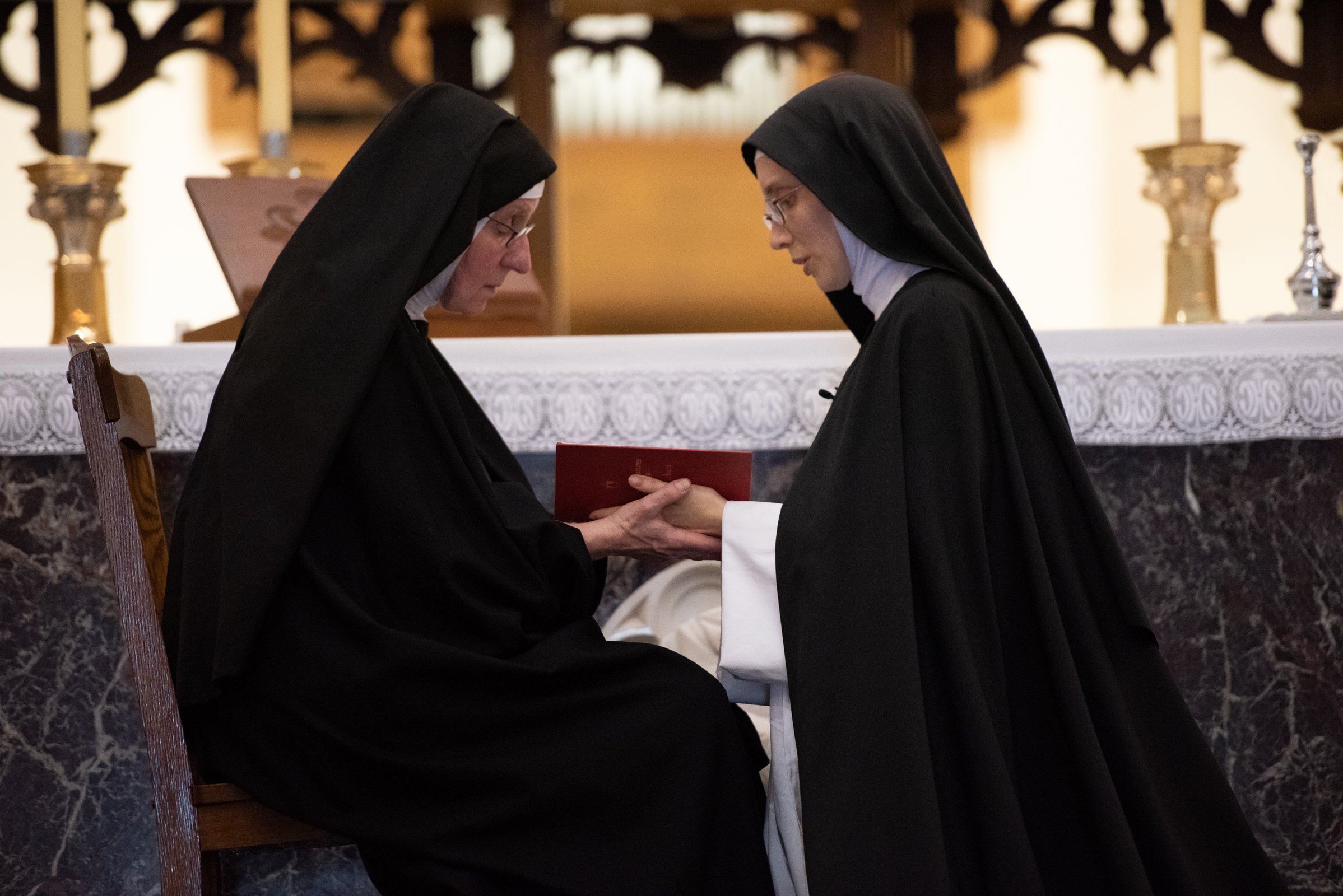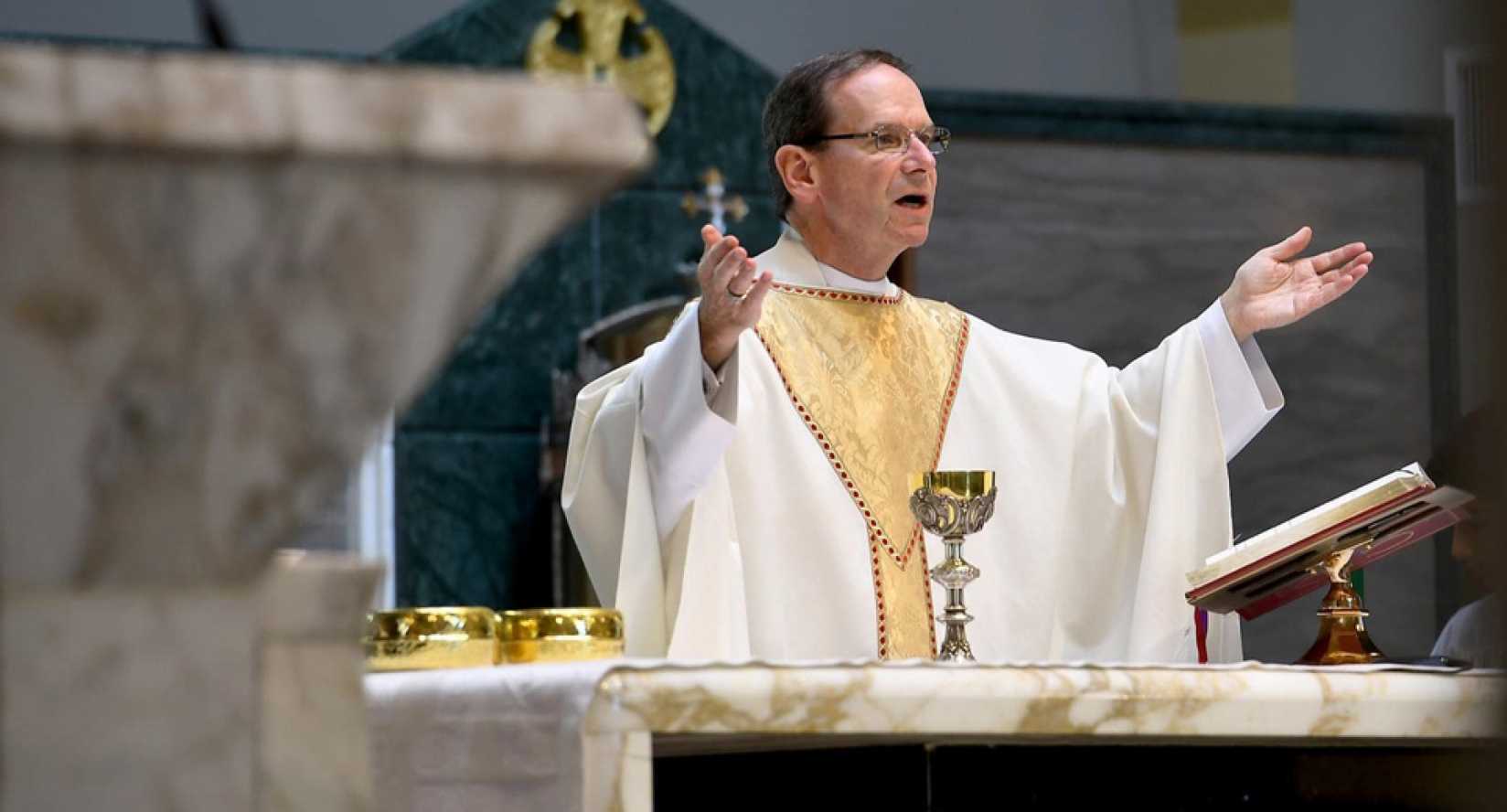Today, the Catholic Church is experiencing the Synod on Synodality. What does this mean? What is really happening?
🇮🇹 Sinodo sulla Sinodalità: qual è la meta?
“The contours of the synod process are becoming increasingly clear. It provides a megaphone for non-ecclesial opinions”. Raising his voice is Mgr. Rob Mutsaerts, bishop of the diocese of ‘s-Hertogenbosch in the Netherlands. On his blog the prelate wrote: the synod document presented reads “This means a Church that learns, by listening, to renew its evangelising mission in the light of the signs of the times, in order to continue to offer humanity a way of being and living in which all can feel included as protagonists”. But who are those who feel excluded, Mutsaerts asks? “In short, those who do not agree with the teachings of the Catholic Church” he replies.
He is not the only bishop who has asked the Pope for more prudence with regard to the method by which this synodal path is being conducted. Rather than listening to everyone, this extraordinary event is becoming a twitter battle, which risks giving voice only to those who shout the loudest. In the end, the positions most responsive to the needs of civil society get the front pages in the newspapers and those who continue to affirm Church doctrine are deliberately silenced by the media.
“The mission of the Church, Mutsaerts states, is not this. It is not about examining all opinions and then coming to an agreement. Jesus commanded us something else: to proclaim the Truth; it is the Truth that will make you free”.
 Want to stay informed? Sign up
Want to stay informed? Sign up
Catholic Church has a problem
In the past few hours, the UISG and USG also presented a document collecting the positions of those who responded to the synodal questions. This is not all superiors and superiors, let us be clear, but 224 congregations participated, 169 female and 55 male. The document is of particular concern and must necessarily lead to reflection. They write: "some express scepticism that, in some dioceses or parishes, critical voices can be heard without being censured".
In essence, the superiors general, in a document addressed to the synod established to "listen to everyone", complain that critics are given the opportunity to express their ideas. This is only the beginning of a document that has the unbelievable. An aggressive and contemptuous tone towards the priestly ministry and towards those who ask to keep the focus on fundamental questions of faith and not on the social.
The climate that has spread, today also among religious, is one of hatred towards those who preach a Church focused on its main nature: affirming the Truth. If in past years the most used words were Council and Synodality, today the word Clericalism has been added. No one is yet clear what it means, what clericalism is, but everyone talks about it. "The Council says so", was and is the phrase with which all the most absurd actions have been justified, especially in the liturgical sphere.
If, by misfortune, the person who uttered it finds himself in front of someone who has read this blessed Constitution Sacrosanctum Concilium, chaos breaks out. The discussion, always and everywhere, ends with the accusation of being fundamentalist, too attached to the law, to the rules. Yet Joseph Ratzinger replied to the impertinent RAI journalist: "To label a document fundamentalist is a way of shirking dialogue, it is a way of saying I am not talking to you". Once again, we cannot but agree with the Holy Father Emeritus. Whenever there are no arguments and you know you are in the wrong, you proceed by shutting down dialogue.
Today, anyone who says that the priest is the one who must preside and celebrate the Eucharist, deal with the administration of the sacraments and the care of souls, is labelled a clericalist. But how is it possible that men and women religious do not recognise the importance of priestly character and grace? Thomas of Kempis writes: "each time he celebrates, the priest cheers the angels in heaven, edifies the Church on earth, and brings relief to the dead".
This does not imply, as some would have it, that the priest is hypocritical, feels more important than others, more powerful, etc. Absolutely not. Rather, the priest has a responsibility. For this reason he will have to give an answer to God. Of course, there is no shortage of examples of priesthood lived unworthily, but one cannot claim that such subjects are the practice. One cannot eliminate the priesthood, strike it down, because someone has created scandals. Chrysostom wrote: 'Quasi communis totius orbis pater est Sacerdos. Curam igitur omnium gerat oportet, sicul et Deus, cujus Sacerdos est'. Care.
The document written by these religious, instead, becomes a way to bash the priesthood in the name of collegiality, collaboration... They tend to demonise those who invite the faithful to commune with the Church, before asking for the sacraments.
"Synodality is seriously compromised when the Eucharist and the other sacraments are used as weapons of discrimination and division: exclusion and fear are promoted from the pulpit, stifling alternative and responsible points of view on ethical and moral issues." Those who, only a few lines before, lamented the critical opinions towards the Synod, now wonder how it is possible to ban the sacraments from those who are not in communion with the Church. Are critics to be listened to or not?
What Bishop Mutsaerts says is therefore correct: people here only want to pursue their own line despite the obvious contradictions. Why are these people led to believe that the Catholic Church is the social centre willing to accommodate everyone? Any religious confession has its own rules, its own doctrines, and no one would think of entering a synagogue and saying: 'No, whatever, from tomorrow men enter without a yarmulke (Kippah) because otherwise we feel excluded'. On the contrary, whenever one enters, one falls into religious silence and conforms to the rules dictated by the hosts. And rightly so. We too visited the Synagogue in Rome and when we went we conformed to their rules but we did not bring our demands to them. Clearly, if one is not willing to follow that creed, one respectfully leaves and goes home.
"The synod process, says the bishop, so far resembles more of a sociological experiment and has little to do with the Holy Spirit who should resonate through all voices".

Two sides and different weapons in hand. This has become the liturgy today. If in 2013 the climate was one of “silent endurance”, today the battle is in full swing and all possible weapons are being used. Two sides and different weapons in hand. This has become the liturgy today. If in 2013 the climate was one of “silent endurance”, today the battle is in full swing and all possible weapons are being used.
On one side we have those who have an ideology of the liturgy and on the other we have priests and faithful who demand to celebrate according to the vetus ordo. If we scroll through a few pages of newspapers, a few twitter accounts or listen to a few lectures, it emerges that “the traditionalists hate the new Mass, they disavow the Second Vatican Council and carry on a war that creates division in the Church”. Yet, if we look at the reality, the issue presents itself in a totally opposite way. Those who are called ‘traditionalists’, with a derogatory meaning, simply ask to be able to celebrate in a rite that they consider closer to their sensibilities.
However, it is not the ‘traditionalists’ who create division and uproar, but rather those who call themselves ‘modernists’. Two terms that are used, all too often, in a simplistic manner and that cannot define the Catholic Church. Also because, let us be frank, the faithful who come to Church sincerely seeking the Lord, care nothing about how others celebrate. He will participate in the rites that he feels are closest to him. These ideological battles are promoted by those who do not sincerely seek God but live off these invectives that they usually launch on social networks. One of the divisive haters is Andrea Grillo, who survives thanks to these ideological battles he has been waging for years (Grillo has ideologised clerics who support him). Were it not for his ideology, he certainly would not be teaching at the Pontifical Athenaeum Sant’Anselmo. In the past few hours, Andrea Grillo has insulted the Archbishop of Bologna, His Eminence Cardinal Matteo Maria Zuppi, just because he presided at Vespers in the Ancient Rite. The Cardinal did not celebrate Holy Mass, he only presided at Vespers. Yet, Grillo told him that he is ‘stupid’. Andrea Grillo is not a liturgist and talks about liturgy, he is not a canonist and talks about canon law. It is unclear under what title a layman can afford to insult a Prince of the Church.
How is it possible for a Cardinal of the Holy Roman Church to be called a fool by someone who teaches at a Pontifical Athenaeum? Is it possible for a priest to be insulted because he has done what he is asked to do by God the Father: heal souls? The faithful who feel close to the ancient rite have no right to be part of Christ’s fold. The end. That is the ruling. The Synod listens to everyone but them. To us, the contradiction of this behaviour seems clear. Even as far as religious life is concerned, these nuns and brothers have been listened to, but not all those monasteries, even cloistered ones, that diligently live the rule. Those that are labelled ‘traditionalists’. Why?

This attitude of rejection also gave rise to the Apostolic Letter Traditionis Custodes, which sought to put a stop to 'the use of the Roman Liturgy prior to the reform'. If with Summorum Pontificum, the Holy Father (now Emeritus) Benedict XVI, had made it clear that it was a single rite with two forms, Francis swept it all away by claiming that "The liturgical books promulgated by the saintly Pontiffs Paul VI and John Paul II [...] are the only expression of the lex orandi of the Roman Rite".
This created an even more pronounced rift and made it clear: "We tolerate you but know that you are not welcome". There is no other definition of that disposition. Once again, therefore, Francis chose to immolate 'on the altar of hypocrisy' a portion of the faithful. The justification was: "There are too many people attached to that rite who reject the Second Vatican Council" and "There are too many quarrels and divisions". Did the Pope, the bishops, ask themselves how many groups reject the Second Vatican Council? Have they wondered who is creating division? It does not seem so. Otherwise they would have realised that within the Church we have people who reject fundamental dogmas of the faith, not a Council, but nevertheless for them the door remains open. As we have pointed out in other articles, the problem then is to understand which Council is being rejected: the media Council or the Council of documents? Because most of these faithful and these priests, reject the celebration of a Holy Mass that the Council never actually authorised: Masses celebrated on the inflatable mattress, for example.
The process initiated by John Paul II and continued by Benedict XVI, on the other hand, was clearly aimed at making it clear that these two rites can enrich each other. The task, however, must be to bring them closer and not to push them apart.
Religious men and women, however, seem to be clear: "There is a patriarchal and hierarchical model - which is not that of Vatican II - that still prevails in the theological and practical understanding of ministry and the tria munera. Such a model favours clericalism and disregards the fundamental dignity of every baptised person. The historical - social and cultural - supremacy of the masculine considers the clergy as a race apart and motivates an arrogant and disrespectful treatment of the laity and prevents forms of collaboration and mutual relationship. The emergence of young ultra-conservative priests, who are not at all inclined to listen to alternative voices, is striking. The deficient initial and ongoing theological and psycho-sexual formation of seminarians and clergy gives rise to a toxic clericalism, which is adorned with grandiose titles: Holy Father, His Eminence, His Excellency, Superior.... "
Who wants to demonise the priesthood?
In essence, the priesthood is attacked because it belongs to man. It seems to us that the lack of theological training belongs to these religious, not to the 'ultra-conservative' priests. These people would be capable of insulting even our Lord by calling him sexist because he chose 12 men as apostles. Today there would be these nuns ready to say: "No, you should have chosen these people here. You don't understand anything at all". Then come the terms used to demonise: 'hyper-traditionalist', 'ultra-conservative'. These absolute superlatives serve to make people dislike them. What does ULTRA conservative mean? The conservative is already a person who wants to 'conserve, preserve and maintain'. What would ultra be? Moreover, these adjectives define more those who use them, rather than those to whom they refer. If the priest in the parish does his duty, he is called 'ultra-conservative'. Finally, does using the correct titles mean being clerical? Well, we take that risk.
What should be of concern, however, is the rampant arrogance of a certain laity, not the other way around. That same laity that yearns for power. During some celebrations, the priest is reprimanded by the laity because: he has distributed the Eucharist in the mouth, he has made the homily too long, he has sung the preface, etc..
Let us not dwell then on those faithful who never set foot in Church, come once a year and want the priest to say out loud the name of the deceased who is remembered at Holy Mass. Woe, if the name is not heard by the whole assembly. This risks invalidating the Mass. Then there are those who want customised celebrations: the wedding or the baptism with the entrance song of their favourite singer, the funeral with a procession past in front of their uncle's, brother's or great-great-grandfather's house. Are these issues not a concern? Are they not an expression of a faith more akin to a talisman? Sensationalism? The priest must be careful not to dwell more than one minute on 'let us recognise our sins', otherwise he hears puffing in the assembly because then he is late for lunch.
Most of these people who reclaim a position in the Church are people who do not want to serve but want to fill roles. They want to be in charge! It works just like here in the Vatican City State. It is difficult to find the layman who asks to sweep the corridors. Very easy to find people who want to go from being mere sanpietrini (St Peter's Basilica employees) to executive offices. Try asking a layman if he can close the church door because you are in the confessional. The next day the whole village will say you are clericalists.
Are we sure about the path?
Commenting on the words of Cardinal Mario Grech, Bishop Rob Mutsaerts says: "Jesus took a different approach. He listened to the two disappointed disciples on the road to Emmaus, sure. But at a certain point he took the floor and told them clearly that they were going astray. This led them to turn around and go back to Jerusalem. If we do not turn back, we will end up in Emmaus and be even further from home than we already are".
In the synod document, the superiors write: "The pulpit becomes a place to claim donations; sacramental and pastoral actions become means to raise money; the Church appears more as a business than as a sacrament of God". What perhaps needs to be clarified first is that without money the Church would not be able to do what it does. In fact, the Lord does not demonise money but its misuse.
The religious institutes to which these consecrated persons belong are the richest establishments the Catholic Church has. Most of the accommodation facilities belong to them. And, to put it bluntly, having completely abandoned the rules of their holy founders, these structures today also make a lot of money because they are turned into real hotels. Since there are no longer any vocations, because young people are disgusted by this way of life, the old buildings have been repurposed. Therefore, if you really want to promote 'transparency', as they write, do it fully. Precisely in the name of transparency, moreover, it should be reported that the UISG and USG, despite requests, did not provide the data of those who participated in providing the answers that went into this synodal document.
So the question arises: but how many are really those who promote these ideologies? Yet the Pope has told the religious several times: "Be careful of ideologies".
We are aware that there are many religious and nuns who serve the Church with dedication and do not think such nonsense at all. Many of them we know and share their perplexities with us. Men and women who follow the rule given by the founders and spend themselves every day to serve God the Father in silence. Today, however, it is necessary to make noise. One must make one's voice heard and say: the Church is not a parliament!
L.M. e S.I.
Silere non possum